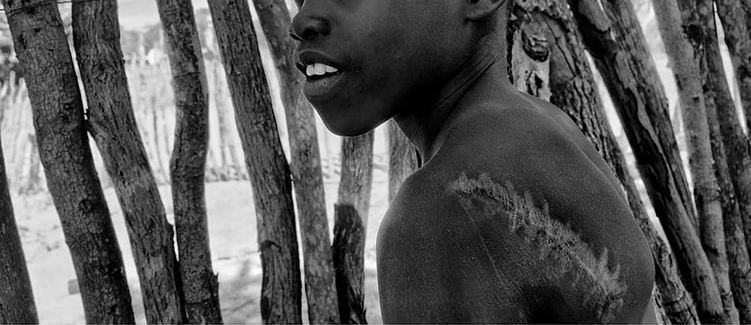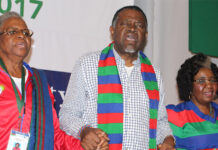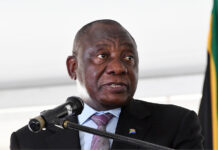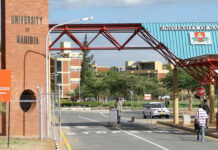By Eliaser Ndeyanale | 2 August 2021
LAST year Ruhepo Shighongo got up at 07h00 to fetch water from the Okavango River before going to work. She never returned.
Shighongo (30) was killed by a crocodile at Rudhiva village, north of Divundu, in the Kavango East region.
Her sister Febronia (33) recalls the day neighbours, who had been at the river, arrived to tell her Shighongo was attacked by a crocodile.
“When we arrived at the river, a crocodile was holding my sister up in its mouth, taking her to an island in the river. I could see she was dead,” Febronia says.
She says her sister was employed at a nearby supermarket and was the family’s breadwinner.
She left two children behind.
Despite officials from the Ministry of Environment, Forestry and Tourism taking the family’s details with the aim of providing them some form of compensation for their loss, Febronia says they haven’t received a cent.
“We are struggling. We grew up without parents,” she says.
Residents of Rudhiva village have accepted that more deaths through crocodile attacks would occur, because residents’ only source of water is the river.
Statistics provided by environment ministry spokesperson Romeo Muyunda indicate that eight people have died in the country as a result of crocodile attacks since 2019.
Two of them are from the Kunene region, four from the Kavango East, one from the Zambezi region, and one from Kavango West.
A 2017 National Council parliamentary standing committee report shows that a father and his two-year-old son were attacked by a hippo while crossing the river at Nzinze settlement in the Kavango West region.
The report also indicates that a crocodile snatched a baby from its mother while the mother was doing washing near the river.
Other people were attacked by hippos while crossing the river in dug-out canoes at villages, the report states.
New Era last year reported that a seven-year-old girl was allegedly killed by a crocodile at Bagani village in the Mukwe constituency in the Kavango East region.
The police said the girl went to fetch water with her grandmother.
“In the process, she was caught by a crocodile in a split second, and her grandmother could not do anything to save her from the animal’s strong jaws.”
NARROW ESCAPE
In March 2021, Benhard Mbathera (27) narrowly avoided becoming another statistic when attacked by a crocodile while washing clothes at the river.
Mbathera, who is also from Rudhiva village, sustained two deep leg wounds, according to her medical report.
According to Rudhiva resident Salothe Murapo, a villager is attacked by a crocodile every year.
Murapo says when they report the attacks, the ministry tells them to stay away from the river.
Muyunda yesterday told The Namibian the ministry pays the family of a person killed by a crocodile N$100 000, N$30 000 if the victim was left with a disability, and N$15 000 for body part that has been lost.
Most residents at Rudhiva are poor and have not seen a tap since independence.
“There is no way we can get away from the river, because that is where we get water to drink and to bath,” Murapo says.
She says they are prepared to fight with the crocodiles to get access to water.
“All I am asking from the government is to give us a community tap.”
Hilda Diveye, the secretary of the Rudhiva village headman, says she cannot tell how many people have been killed by crocodiles.
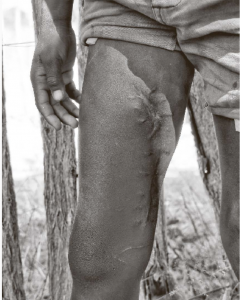
“They are a lot. I witnessed some of the incidents with my own eyes. They must provide us with tap water so we can stay away from the river,” she says.
NEGLECT
In March, the Ministry of Agriculture, Water and Land Reform’s spokesperson, Chrispin Matongela, said the government was aware that the closest tap to Rudhiva village was 30 km away.
He said Rudhiva and other areas are on a list of villages set to benefit from a rural water coverage programme through the drilling of new boreholes.
Matongela said the ministry is introducing a water pipeline network in the Kavango East and West regions.
“This is in line with the government’s objectives of ensuring that access to water is within a radius of 2,5 km,” he said.
Matongela said the initiatives his ministry is undertaking would prevent many rural communities along the Okavango River from becoming victims of crocodile attacks.
He said Namibia, in collaboration with the Food and Agriculture Organisation, is working on establishing water canals from Nzinze-Mpungu and Ndonga Linena to Ncaute to harvest flood and rain water for food production and to enhance water security.
WATER POLITICS
Kavango East governor Bonifatius Wakudumo earlier this year said the number of crocodiles in the river has increased.
He urged people to coexist with the reptiles.
“We need to coexist, as in the past. We all depend on the river for water and food,” he said.
Wakudumo agreed that providing potable tap water in the region would help reduce the number of people and animals killed by crocodiles.
Ndonga Linena constituency councillor Michael Kampota last month said people from his area are frequently attacked and killed by crocodiles.
“In November 2020, a crocodile killed a woman at Shitemo village. Her bones were discovered only a week later,” he said.
Kampota said there is also a need to create more awareness to discourage people from swimming in the river.
Mashare constituency councillor Phillip Mavara said people in his area continue to be killed by crocodiles.

